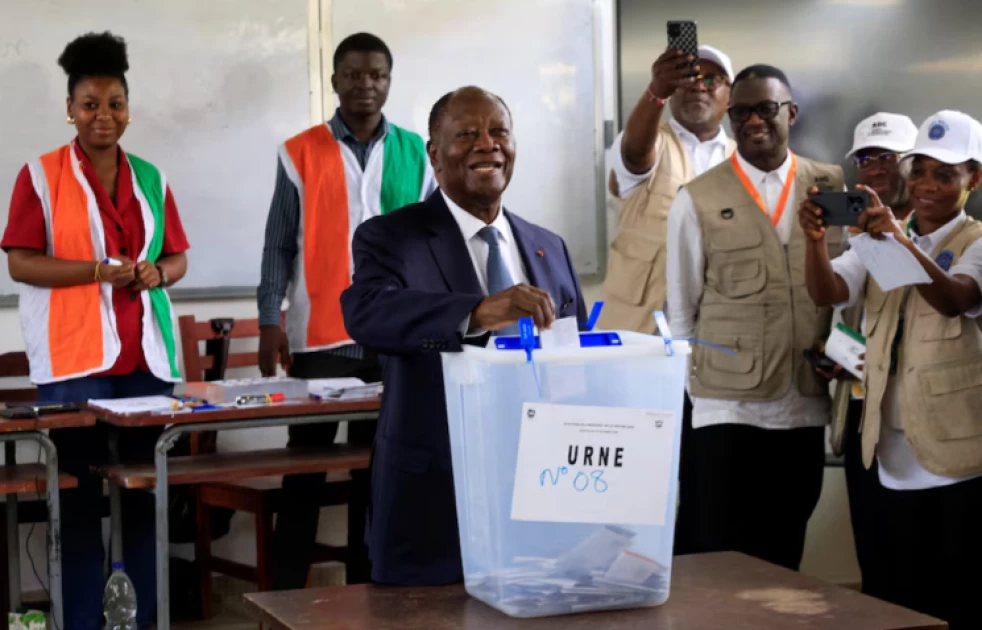Ivory Coast votes with Ouattara's legacy, age in focus

Ivory Coast's President Alassane Ouattara, who is seeking a fourth term, votes during the presidential election at a polling station at the Lycee Saint-Marie de Cocody in Abidjan, Ivory Coast, October 25, 2025. REUTERS/Luc Gnago

Audio By Vocalize
Ivory Coast is voting in a presidential election on Saturday
with incumbent and strong favourite Alassane Ouattara, 83, claiming credit for
nearly 15 years of economic growth and relative stability while hinting it will
be his final campaign.
A former international banker and deputy managing director
of the International Monetary Fund, Ouattara took power in 2011 after a
four-month civil war that killed around 3,000 people.
The war was triggered by the refusal of his predecessor,
Laurent Gbagbo, to acknowledge defeat in the 2010 election.
More than eight million people are registered to vote on
Saturday. Polling stations close at 6 p.m. local time (1800 GMT). Provisional
results are expected within five days. A runoff will be held if no candidate
wins more than 50% of the vote.
Gbagbo and Tidjane Thiam, former CEO of Credit Suisse,
were deemed ineligible to run this year, and the remaining opposition
candidates lack the backing of a major political party, making Ouattara
the clear favourite.
Announcing his candidacy in July, Ouattara said a fourth
term would be one of "generational transmission." This week, he
acknowledged that "it's not easy to work at the same pace" now that
he is in his 80s.
As polling stations opened at 0800 GMT in the Adjame
district of the commercial capital Abidjan, even Ouattara's supporters said he
should be nearing the end of his career.
"He has really changed the image of Ivory Coast, but
this should be his last mandate. We need to pass the torch to the new
generation," said Souamane Cisse, a 44-year-old driver.
Schoolteacher Fatou Fofana, 48, also said it was time for
younger leadership but only if the transition is peaceful. There is currently
no clear choice for a successor in the ruling party.
"It needs to come at the right time," Fofana said.
"We need security."
The world's biggest cocoa producer is among the
fastest-growing economies in the region. Its international bonds are some of
the best-performing in Africa.
Ouattara has tried to diversify economic output, with mining a
key focus, while investing in schools and road infrastructure to attract more
private investment.
Alfred N'zi, 36, voting in the Abidjan suburb of
Bingerville, told Reuters he lost his job three years ago at the port and had
been unable to find a new one.
"I didn't want to vote at first, but I came to vote for
change. I want things to change," he said, declining to specify which
opposition candidate he would back.
Landry Ka, a 22-year-old student, said young Ivorians were
"tired of seeing old people making decisions for us, the younger
generation."
Ka said he is backing Simone Gbagbo, the former first
lady and Ouattara's highest-profile challenger. She is 76.
The youngest candidate in the race is former commerce
minister Jean-Louis Billon, at 60. He failed to get the backing of the main
opposition party PDCI, led by Thiam, who is 63.
"Many young Ivorians express deep scepticism toward the
political elite, citing persistent unemployment, economic inequality, and a
lack of meaningful representation," said Chukwuemeka Eze, director of the
Democratic Futures in Africa Program at Open Society Foundations.
Though Ivory Coast has a history of election-related
violence, this year's campaign has been mostly calm, with scattered protests in
numerous locations including the political capital Yamoussoukro, where
authorities imposed a curfew Friday night.
The government has deployed 44,000 members of the security
forces throughout the country and enforced what Amnesty International said was
a disproportionate ban on protests.
Hundreds have been arrested, and the interior ministry said
dozens had received prison terms of up to three years for offences including
disturbing public order.
Government spokesperson Patrick Achi, a former prime
minister, told Reuters that the government protected freedom of speech but was
also determined to maintain order.
"Let's keep stability, and then the generation to come
will improve. But at least the economy that went through so much won't again be
destroyed," he said.


Leave a Comment